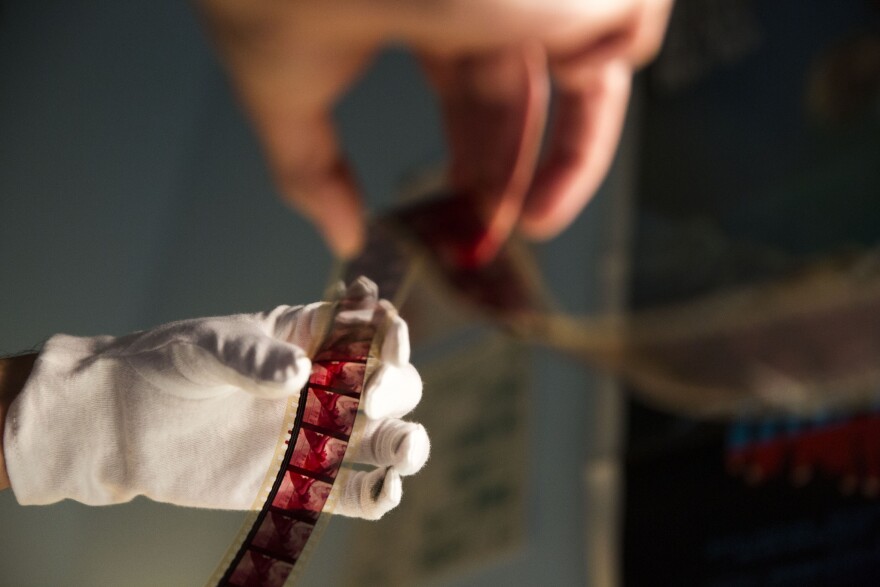Tim League, the founder and owner of Alamo Drafthouse, has been quietly collecting film prints of obscure movies from the 1960s and '70s for the past two decades. This year, League will begin producing DVDs based on prints from the collection.
His collection began with a one-way plane ticket to Missouri in 1999. He and his wife, Karrie, had just opened the first Alamo Drafthouse in Austin when he got a tip about a warehouse filled with old movies on 35-millimeter film.

“I went with cash in my pocket and made a deal on the spot to buy everything,” he says. “So I was driving home with about 500 film prints in a grotesquely overloaded rental truck, and it was dawning on me that, you know, what the hell am I doing? What am I going to do with all these movies?”
The answer? Start a film club and show the prints at his theater in Austin. That film club continues at the Alamo Ritz today as Weird Wednesdays. Each Wednesday, the theater shows a film from League’s collection, which has grown so big that he had to start a nonprofit to manage loans and acquisitions. He named it the American Genre Film Archive and hired two film buffs to run it.
Inspection and preservation
Sebastian del Castillo is one of those film buffs. The head archivist is inspecting film in his office; pink and black celluloid glides over his white cotton glove.

“So this is kind of exciting because we’re taking a look at this print that we purchased off of eBay for the first time," del Castillo says.
The film is called Please Don’t Eat My Mother. “It’s a sexploitation version of Little Shop of Horrors,” says Joe Ziemba, director of the AGFA.
Ziemba says the AGFA collection, which now boasts more than 3,000 titles, is primarily made up of exploitation films.
“As its very nature the definition is to exploit," he says, "so it’s taking an element of something and getting the most money out of it as you can."
It may sound cut and dry from Ziemba's description, but – if the titles alone aren't enough indication – these films go to some pretty weird places.
“So [the filmmaker] might get hired by someone who’s like, 'I need a movie in two days and you have $10,000. Go do it.' And they’re like, 'This is my chance to get what I want to get off my chest for years,' and it takes the form of a yeti gore movie,” Ziemba says.
The film del Castillo is inspecting is in pretty good condition, which he’s excited about since it only cost a few hundred dollars. Many of the prints in the collection are among only a few copies left in the world, and prints in this condition can cost thousands of dollars, he says. This begs the question: Where does the money for all of this come from?
The sequel
“At the end of the day, AGFA is a nonprofit," Ziemba says. "AGFA is helping to fund cool projects that will, in turn, fund more cool projects. So, the goal is to just keep it going."
Most of these projects have been modest, such as renting out films to other repertory theaters and screening the movies at Weird Wednesday and a spinoff called Terror Tuesday (also at the Alamo Ritz). But the next project is going to be big. AGFA has partnered with a film distributor in Seattle called Something Weird to roll out a collection of DVDs scanned from the AGFA collection. They will put out a new release each month, starting with The Zodiac Killer this July.
“All the research we’ve done, based on Drafthouse films and the repertoire of titles they’ve released, everything is pointing to that this is going to work,” Ziemba says.
Ziemba says he's not worried that people will stop caring about film once the whole collection is digitized. He suggests going to Terror Tuesday to see why.
Cinematic impact
The theater is sold out for the 10:30 p.m. screening of the original film print of The Curse of Frankenstein. After a short clip warning the audience to turn off their cellphones and be quiet, Ziemba steps out on stage to introduce the movie. The Hammer Films' movie premiered to critical “disdain” in 1957, he says.

“May 9, 2017, 180 people are gathered here tonight to watch a movie that is 60 years old in a theater,” he says.
The crowd goes wild.
A little later, he asks how many people in the audience went to see the latest Star Wars blockbuster. The response is a few raised hands.


